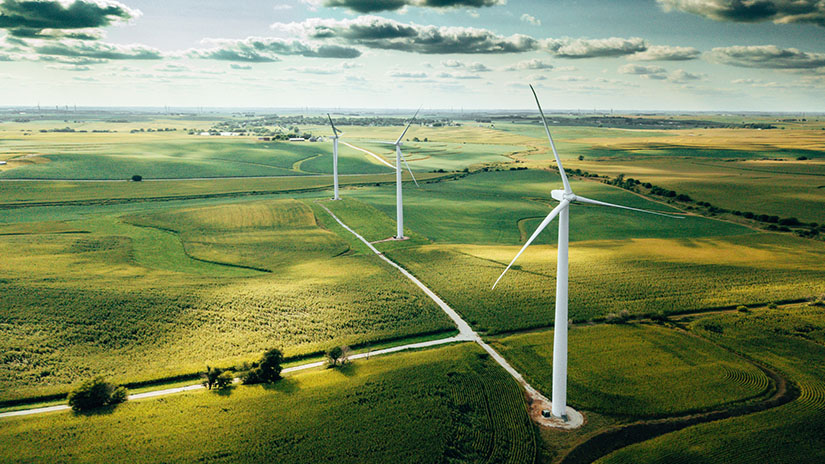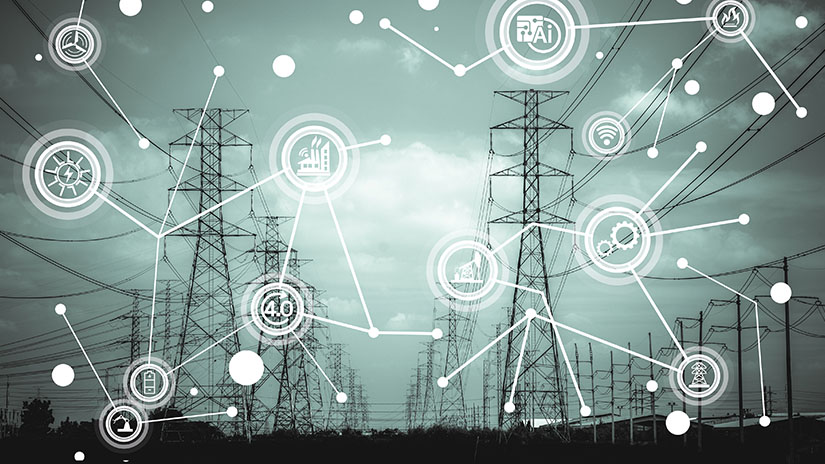By David E. Wechsler, Senior Vice President, Consulting and Offerings Global Leader, Hitachi Vantara; and Anthony Allard, Executive Vice President and Head of Hitachi Energy North America
As concerns about climate change intensify, the idea of achieving a carbon-free energy system by 2050 is shifting from an objective to an obligation. The Smart Electric Power Alliance reports that as of April 2021, 75% of U.S. power customers use a utility that has a carbon- or emission-reduction goal1. Fifty-three utilities committed to being carbon-free or net-zero by 2050. As ambitious as those targets are, the Biden administration has set the even more aggressive goal of transitioning to carbon-free electricity by 2035.
Economic-stimulus packages introduced in the U.S. and Canada aim to accelerate the post-pandemic recovery and fast-track the future of sustainable energy. These initiatives will have a direct impact on the rapid adoption of renewable energy and will establish electricity as the backbone of the North American energy system.
Digital innovation plays a massive role in helping these initiatives and regulations translate to a better society, environment and economy.

This opportunity for a more sustainable world also represents a formidable challenge: Meeting the aforementioned goals will double electricity consumption by 2050, which will require substantial investments into upgrading the electrical infrastructure.
With the increasing focus on energy decarbonization and transitioning to renewable power generation, utilities face the challenging task of seamlessly integrating renewables into their existing energy systems. Two of the biggest obstacles being, the vast amount of geographically dispersed data that makes it difficult to track assets essential to optimizing clean energy supply and demand, and the lack of a strategic roadmap for deploying new technologies to optimize energy generation processes to achieve the goal of decarbonization.
Digitalization will be key — and this digitalization will not only make power grids more flexible and reliable but also allow energy organizations to integrate more renewable energy sources. By leveraging widely-deployed sensing, vast amounts of data and advanced analytics, the digitalization of the grid will drive improved safety, efficiency and resilience.
Technology is on our side, as is the increasing speed with which technology innovations become ready for commercialization. Smart devices — including appliances, machinery and equipment enabled by the Internet of Things (IoT) — are becoming more intelligent and more affordable. At the community level, this has made renewable energy, most notably residential- and campus-scale solar power, more accessible logistically and financially, while the cloud and open APIs streamline the process of integrating those innovations within a legacy infrastructure.
The result: The lower costs of going green and the rising number of adopters are sparking a green virtuous cycle. Individual consumers, businesses, campuses, arenas, and similar large public facilities and entire communities have converted their energy systems to carbon-free microgrids.
The final enabler is the creation of a modern, connected grid ecosystem that not only monitors and responds to fluctuations in energy demand but also connects regulatory entities, operators, and distributed generation assets. Digital technologies are key to unlocking the capacity to balance supply against demand and manage renewable resources.
For example, 88% of wind resources in the U.S. are located between the Rocky Mountains and the Mississippi River, but most consumption occurs on the coasts. In addition to investing in more transmission infrastructure to expand the grid, energy decision-makers need technologies to make this infrastructure more reliable and efficient. High-voltage, direct-current (HVDC) technology enables transmission over long distances, helping utility operators manage supply in real time. Hitachi Energy recognizes that tapping into the control and automation enabled by artificial intelligence (AI) is essential to meeting today’s energy resource distribution challenges, whose complexity is beyond human capacity to manage. AI is rapidly becoming a critical element of the modern grid and the modern utility toolbox.

In addition to innovations in power systems and sensor technologies, advances in data collection and analysis are improving the industry’s ability to eliminate waste from excess power losses. This allows grid operations to be sustained at the optimal level of precision. Energy data analytics also provides tools for control - including remote control - of the new smart energy ecosystem, enabling utilities to analyze all aspects of energy generation and consumption and monetize stored energy.
Data plays a central role in the move to carbon neutrality. Enterprises in the energy industry will need a combination of in-house capabilities and partnerships that ensure that they can fully mine and realize the value of their data.
This is where partners like Hitachi come in. With its expertise in green and digital technologies, Hitachi is helping clean energy producers and utilities implement a data-driven approach to energy management, optimization and delivery.
Investment and regulatory constraints pose additional challenges to energy conversion and convergence. Further, operators need support beyond loan assistance, tax relief subsidies, and investments in infrastructure or R&D to change the commercialization paradigms that exist in the energy marketplace today. Environmental goals, no matter how laudable, must consider the need for utilities to remain sustainably profitable while hitting carbon targets. The technological advances and innovations of energy leaders like Hitachi make the transition to a carbon-free future more affordable, feasible and manageable — and make even the most aggressive energy objectives more attainable.
To learn more about how Hitachi is empowering local communities to extend positive environmental impacts worldwide, visit https://www.hitachienergy.com/.

Senior Vice President, Consulting and Offerings Global Leader, Hitachi Vantara
David Wechsler is a Founding Partner, Senior Vice President and Global Consulting and Offering Leader for Hitachi Vantara. David has been identified in iSource Magazine’s “Pros to Know” issue, as one of consulting’s “Best and Brightest.” Mr. Wechsler has more than thirty-five years of business experience encompassing Management Consulting, Operations Management, Sales Leadership, Materials Management and Integrated Business Software Systems including extensive expertise in process optimization relating to evaluation, development and implementation in manufacturing & distribution industries.
He has performed work in several industries including; extensive experience in Industrial Manufacturing, Consumer Products, as well as Automotive, High Tech and Services. Additionally, he has served in both discrete and process environments. As one of Hitachi Consulting’s founding partners, David has held a wide variety of roles during his years with the organization including; National Sales Leader, National Consumer Products Industry Leader, Global Water Management Solution Leader, Midwest Region Practice Leader and National Supply Chain Practice Leader among others.

Executive Vice President and Head of Hitachi Energy North America
Anthony Allard is Executive Vice President, Managing Director, United States and Head of Hitachi Energy’s business in North America. Allard was most recently CEO of BECIS, a leading energy-as-a-service-solution provider in Singapore. He held several executive-level positions in the power sector, including General Manager and Board Member for GE Prolec Transformers. He was General Manager for the GE-XD High Voltage Products partnership and held strategy and operations management roles for Alstom Grid in North America and the Americas.
Allard holds an MBA from Yale University and a Masters in Electrical Engineering and Telecommunications from the Institut Polytechnique de Grenoble, France.